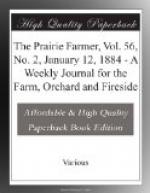HOW TO RAISE WHEAT.
Prof. Hamilton (see No. 52) has hit the nail squarely on the head in his essay. I doubt if there has been a more valuable article on wheat-growing in the public prints, for many a day. It gives a new view of the question, and in my opinion illustrates, at least in part, why it was that in the early days of wheat-growing throughout the prairie States, the crops were so much better than now. Wheat was then sown for the most part on newly broken prairie sod, and its character was such that the grain could not be deeply covered, nor could the ground be heaved so much as in later sowings, when it has been mellowed by deeper culture. Prof. Hamilton’s essay ought to be read by every wheat-grower in the country. Other valuable articles in No. 52 are those of J.H., on Corn, Prof. Hall’s lecture on Schools, and many others—not omitting what the two talented ladies say about hens and bees.
COUNTS AND BARONS IN AMERICA.
Some alarm has been manifested in certain quarters, and Congress been inquired of, concerning the fact that divers European noblemen have been purchasing large bodies of lands in our public domain. There are no laws, I believe, to prevent foreign noblemen from acquiring lands in large or small quantities in our Territories; but it is clearly contrary to public policy to permit these, or our own capitalists or syndicates to do this thing. The public lands should be held for actual settlers, and for them alone; and it is to be hoped that Congress will so amend the laws as to prevent English or European lords, or American lords, from acquiring large bodies of land. The Government has been generous—too generous—to the railroads in the gift of lands; and that policy ought now to cease, and the roads required to fulfil their side of the contract to the letter.
MONOPOLY—AGRARIANISM.
In connection with the above, it will do to say, that as monopolies increase and gain strength, agrarianism also is extending. Legislation should be so shaped as to check the one, and give no cause for the other. Good government and strict regard for the rights and interests of the masses, are the surest means of checking agrarian and nihilistic tendencies. Had the French monarchy and governing classes been just, the revolution would have been impossible.
TO CONCLUDE.
It does seem to me that your magnificent offer of your Standard Time or Commercial Map—worth $2 itself—in connection with the prairie farmer, all for $2, ought to bring you hosts of subscribers, and that it does is the hope of
Diogenes.
FIELD AND FURROW.
The best temperature to preserve apples, potatoes, turnips, or any other roots or fruits stored in the cellar, is just above the freezing point.




